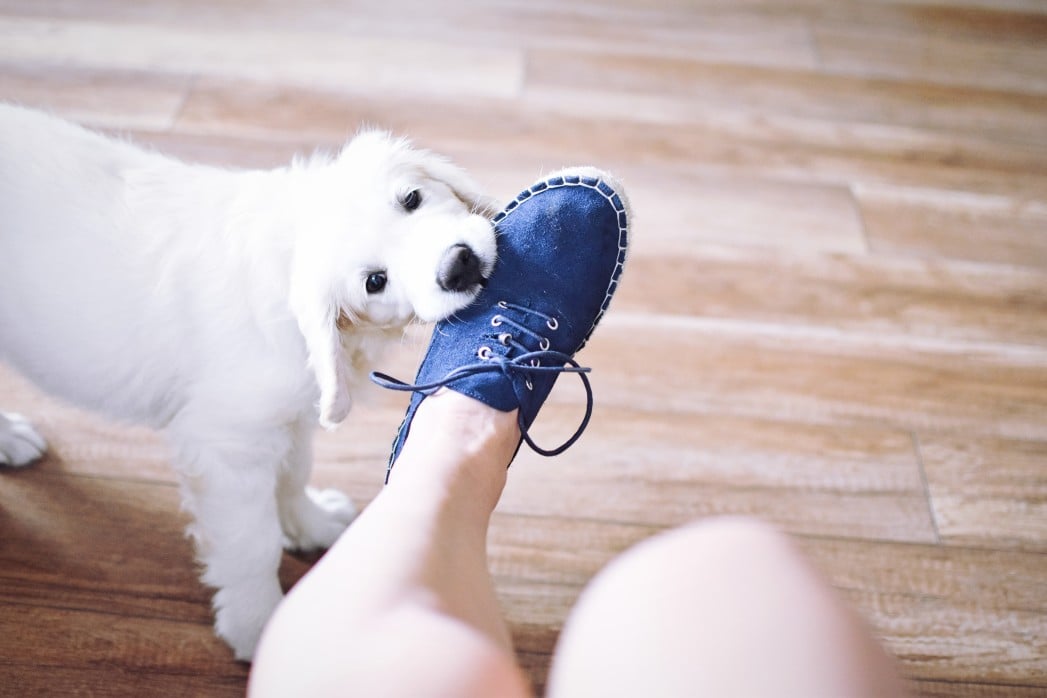When do Goldendoodles Stop Growing?! The Complete Goldendoodle Growth Stages Guide (Vet Approved!)
The Complete Goldendoodle Growth Stages Guide | Written by Veterinarian, Dr. Sara Ochoa, DVM
Have you recently gotten a Goldendoodle puppy, or has your Goldendoodle recently had puppies? Are you wondering when do Goldendoodles stop growing? There are many things that you need to know about the growth and development of these new puppies. This article explains everything you need to know about the growth and development of your new Goldendoodle.
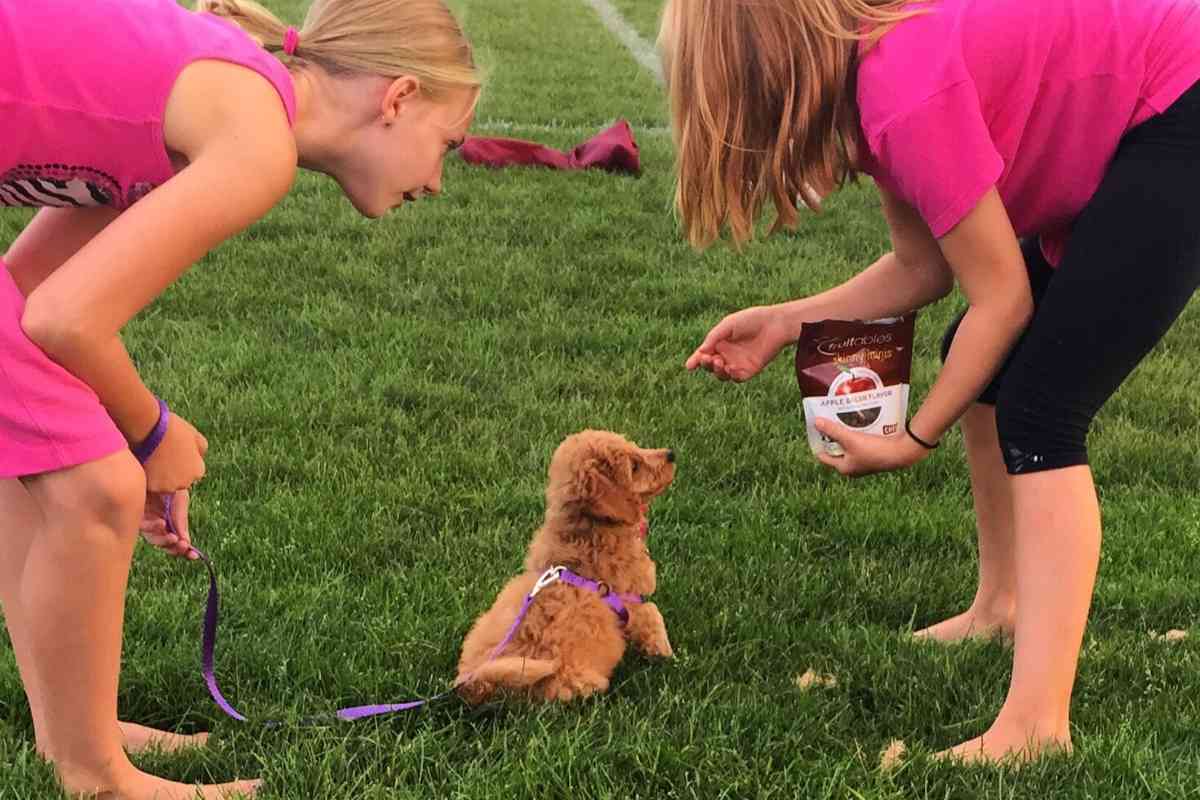
What are the growth stages seen in a Goldendoodle?
Goldendoodles have 3 main stages of life: Puppy (birth until they are 1 or 2 years old), Adult (beginning around 1 or 2 years old), and Senior (from about 7 years old until their death). Each stage can be further broken down, as a new puppy is very different than a 9-month-old puppy, and a 2-year-old adult is different than a 6-year-old adult.
There are lots of different sizes of Goldendoodles, which can make it harder to predict which will be Mini Goldendoodles and which will be Standard Goldendoodles. Here’s a Goldendoodle size chart to help you predict your dog’s size.
A Goldendoodle puppy’s growth and development can be broken down into 7 main stages:
- Stage 1: Birth to 3 Weeks
- Stage 2: 3 weeks to 7 Weeks
- Stage 3: 7 weeks to 12 Weeks
- Stage 4: 3 months to 4 months
- Stage 5: 4 months to 10 months
- Stage 6: 10 months to 1 Year
- Stage 7: 1 year and Older
Goldendoodle Puppy Growth And Behavior Stages
From the time that your puppy is born until it reaches adulthood, they are continually growing and changing.
These are the typical week-by-week Goldendoodles stages that you will go through with a new Goldendoodle puppy and what signs to look for that they are not developing correctly. This is not only about the physical growth stages of our Goldendoodle but also your Goldendoodle’s behavior stages, broken down into weekly expectations.
Predicting average weights in Goldendoodles is challenging. The parent breeds are the strongest predictor of size, but hybrids can be unpredictable. Standard poodles and Golden Retrievers are both large dog breeds. However, a toy poodle or mini poodles can be bred to larger breeds like Golden Retrievers to produce a much smaller dog, like a toy Goldendoodle or even teacup Goldendoodles.
Since there aren’t standard sizes well established for this mixed breed dog, pet owners may struggle to calculate the full height and weight of their dog and what growth rates should be. Dogs with long lines registered with the Goldendoodle Association may have more predictable traits, but not as much as an AKC purebred dog.
Stage 1: Birth to 3 Weeks
The first stage in your Goldendoodle puppy’s development will be the first three weeks of their life.
These puppies are born blind, deaf, and without teeth. These first weeks are a very critical time in their development. During this time, the pups’ needs are very easy to take care of – food and sleep, and most of this care is provided by their mother.
Most of a puppy’s growth takes place when they sleep, so allowing your Goldendoodle puppies to sleep is very important.
Your puppy will start to open their eyes at about 2 weeks of age. By the time that they are 3 weeks, their ears will be open, and you will start to notice that their teeth are pushing through their gums.
At the end of this first stage, your Goldendoodle puppy will be aware of their surroundings. They will start to bark, crawl, and interact with the other puppies in their litter.
At the end of this first puppy stage, they are aware of everything that is around them and are trying to crawl, bark, and interact with their littermates.
Stage 2: 3 weeks to 7 Weeks
This stage is very vital to your Goldendoodle puppy’s social development and their physical development.
During this time, they will continue to grow in size rapidly. Most importantly, they start to get more socially active with their mom, littermates, and the people in their lives.
Your puppy will start to learn many new things during this stage of puppy development. Their mother will begin to teach them a few basic manners and start the weaning process.
They will learn how to play with other puppies and what other puppies will tolerate. This is when they will learn how strong of a bite they have and what is okay for playing.

They will usually establish a pecking order within the litter of puppies. This is the main reason why most breeders do not recommend taking the puppies from their litter and mother until they are about 7 to 8 weeks old.
By 6 to 7 weeks of age, your Goldendoodle puppy will be able to be left alone for a short period of time. They will also be doing normal puppy behaviors such as eating
This is also the time that your Goldendoodle puppy will need their first set of vaccines and dewormed. Most breeders will take their puppies to the vet for these vaccines. This way, they know that their puppies have received the vaccines that they need to get started off on the right track.
Stage 3: 7 weeks to 12 Weeks
After 7 weeks of age, your puppy is old enough to leave their mother and other littermates and go to their new home. This will probably be around the age when your first get your Goldendoodle.
At first, try to keep everything just like the breeder had been. This helps keep your puppy on a normal routine while they are adjusting to their new house.
Once your puppy has been at your house for a few days, you can slowly switch things if you want. You may already have a diet you want your puppy to eat.
Make sure that this diet is of high quality and has at least 22% protein in the food. Also, make sure that your dog is eating large-breed

If you do plan on switching diets, make sure that you do this slowly; quickly changing diets can cause GI problems in your new puppy.
At this age, your puppy will be ready to start learning everything and experiencing everything you are ready to teach them. They learn very fast at this age, so it is important to make sure that you are teaching them correctly.
Your puppy can learn basic commands and manners by going to puppy classes. This will also give them socialization with other puppies and people during this stage. Having many different social encounters will help them become a very well-mannered dog.
During this time, your Goldendoodle puppy may show signs of fear. This is a normal experience for a puppy to go through. They may be afraid of certain people, places, or things that they have never been afraid of.
During this time, it is important to continue to socialize your Goldendoodle puppy and show them that these things are not as scary as they first thought they were.
Make sure not to expose them to a lot of simulations at once, as these can cause them to become more afraid.

Stage 4: 3 months to 4 months
This is the stage of development when your Goldendoodle puppy will start to become independent. They may even start to challenge you or even ignore you.
This is very similar to the terrible twos in people. Your Goldendoodle puppy will also start teething around this time. They will have very painful gums, which will cause them to want to bite and chew on anything possible.
Make sure that you are providing your puppy with plenty of approved chewing toys in order to keep your shoes and furniture from becoming the next chew object.
During this stage, you may find that you are telling your puppy no a lot. All this training will eventually pay off, and your puppy will be very well-mannered and do what you tell them to. Most of the time, your Goldendoodle puppy just wants to please you.
All you must do is give them a little patience and love, and they will quickly learn what is expected of them. By starting obedience classes during this time, you will help your puppy become a friendly and well-behaved adult Goldendoodle.
Stage 5: 4 months to 10 months
During this time, your Goldendoodle puppy will continue to grow and develop very quickly. It is very important to continue teaching and training your Goldendoodle puppy.
They will learn how to adapt to different social situations and what behavior is approved and what is not approved during this time. They will also continue to challenge you, so be prepared to stick to your training and not back off.
During this time, your Goldendoodle may act a little bratty. There are going through their teenage years during this time. Also, during this time, do not let your dog play-bite with you, as this can teach them to be aggressive and encourage other dominant behaviors
Around 6 months of age, it is advised to spay or neuter your Goldendoodle puppy. These procedures will help your puppy stay healthy and happy as well as prevent unwanted litters that end up in the shelter.
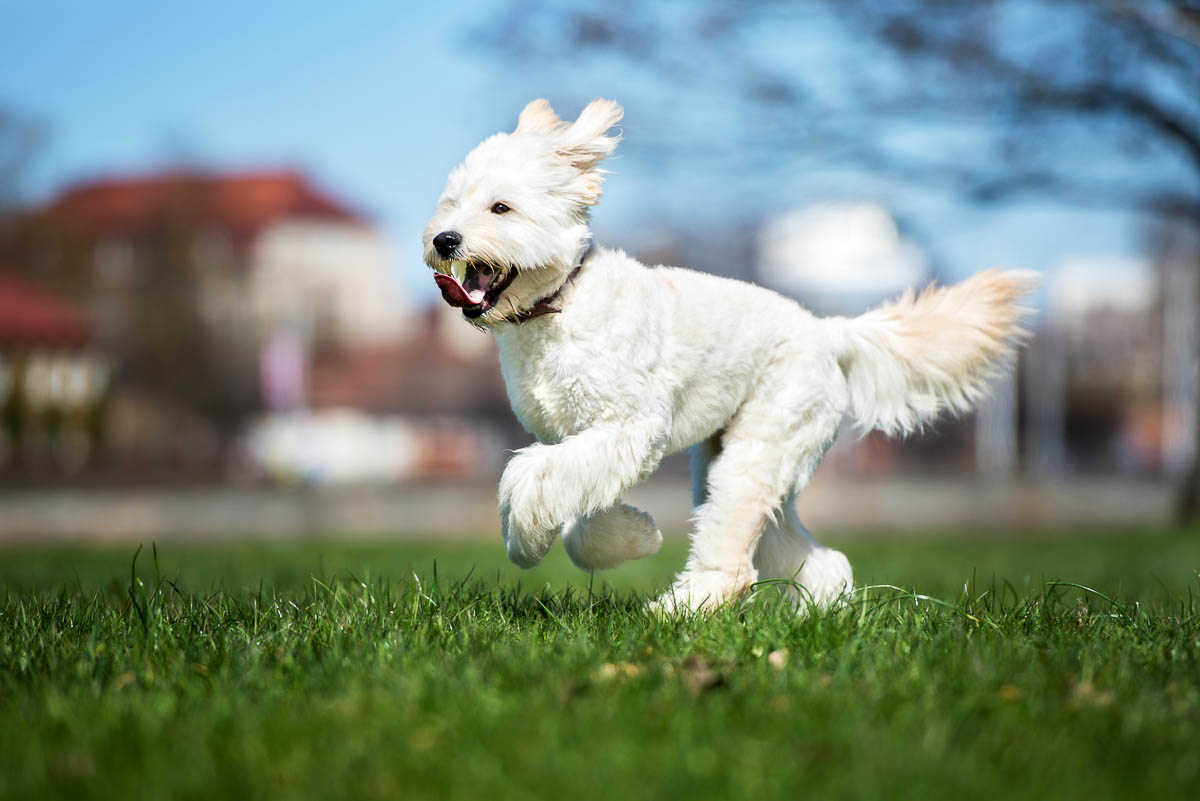
Stage 6: 10 months to 1 Year
During this stage, small Goldendoodles will reach their full size. They will usually reach maturity around 8 to 12 months of age.
Larger Goldendoodles will continue to grow during this time and may not fully develop until they are 18 months to 2 years old.
Your Goldendoodle puppy may now look like an adult dog; they usually are still developing mentally.
They will have a ton of energy and usually not a lot of common sense. You will still need to monitor your Goldendoodle for any unwanted behavior and quickly correct any problems that you notice starting.
Even though they are no longer a puppy, they will still need to continue training and learning commands. At this stage, your Goldendoodle will need lots of attention and exercise to keep them for getting into trouble.
Always use a very firm voice and positive reinforcement when training and correcting unwanted behavior. It is best to have a loving and patient but firm voice when training your Goldendoodle
Stage 7: 1 year and Older
Between 1 and 2 years of age, your Goldendoodle will be fully developed and sexually mature. Your puppy will finally stop growing but may fill out in size just a little. At this point, you can now start exercising more with your Goldendoodle.
They love to go for a jog, do agility training, or go for a long hike. Since their bones are now fully developed, there is less likely that they are going to have joint or stress injuries.

This is also the best time to switch your puppy from
When switching food, it is recommended to switch food slowly. A good schedule for switching diets is:
- 3/4th Old food and 1/4th of New food for 2 to 3 days
- ½ Old food and ½ New food for 2 to 3 days
- 1/4th Old food and 3/4th New food for 2 to 3 days
- 100% New food
Make sure that you slowly transition your Goldendoodle from one diet to the next to avoid an upset stomach. Also, make sure that the diet that you are feeding your Goldendoodle puppy is a high-quality diet.
Goldendoodle Puppy Stage FAQs
When will my Goldendoodle puppy need to be vaccinated?
This is a common schedule most veterinarians follow when vaccinating puppies.
- At six weeks: your Goldendoodle will receive a Distemper/Parvo/Parainfluenza vaccine and a Kennel Cough vaccine. This is usually done by the breeder before you get your Goldendoodle puppy.
- At nine weeks: your Goldendoodle will receive a booster of their Distemper/Parvo/Parainfluenza vaccine and a Kennel Cough vaccine.
- At 12 weeks: your Goldendoodle will receive a Distemper/Parvo/Parainfluenza vaccine, a Leptospirosis vaccine, and a Canine Influenza vaccine
- At 15 to 16 weeks: your Goldendoodle will receive a Distemper/Parvo/Parainfluenza vaccine, a Leptospirosis vaccine, a Canine Influenza vaccine, and their Rabies vaccine
During these appointments, your vet may also check a fecal sample to look for worms in your Goldendoodle’s poop. Most of these worms are microscopic, but some you can see in their stool.
If you see worms, make sure to let your vet know. Your vet can give your Goldendoodle puppy medication to get rid of these nasty worms.
Not only will your pet need vaccines, but they will also need heartworm, flea, and tick prevention. All of these parasites can cause health problems in your Goldendoodle, some of which can be fatal.

What do I need to Do if My Goldendoodle Puppy is Sick?
If you notice something is not right in your Goldendoodle puppy, it is best to take them to the vet. Some very young Goldendoodle puppies can have problems regulating their blood sugar.
If you notice that your Goldendoodle puppy has diarrhea, this can be from the stress of going to a new house, parasites, or even parvo.
Any problems noticed in your puppy could be very serious, your vet can examine your pet and make sure that there is nothing that is wrong with your puppy.
It would be better to be safe than sorry if your pet has something very serious going on. Both parvo and parasites can easily be prevented by sticking to the vaccine schedule and making sure that your puppy is properly dewormed.
How big will my Goldendoodle puppy be?
It can be hard to tell as puppies which one will be the biggest or which one will be the smallest. Usually, from the time that they are born until the day that you pick up your new puppy, all the puppies in the litter will change in size.
At 8 weeks old, the smallest in the litter will usually be the smallest when they are all fully grown. The older your puppy gets, the easier it will be to determine if your puppy will be bigger or smaller.
The exact adult weight can be a guess, but you can expect a miniature Goldendoodle to weigh about 4 to 9 pounds at 8 weeks old and a standard Goldendoodle to weigh over 9 pounds at 8 weeks old, and a medium-size Goldendoodle to fall between the 8 to 10-pound range.
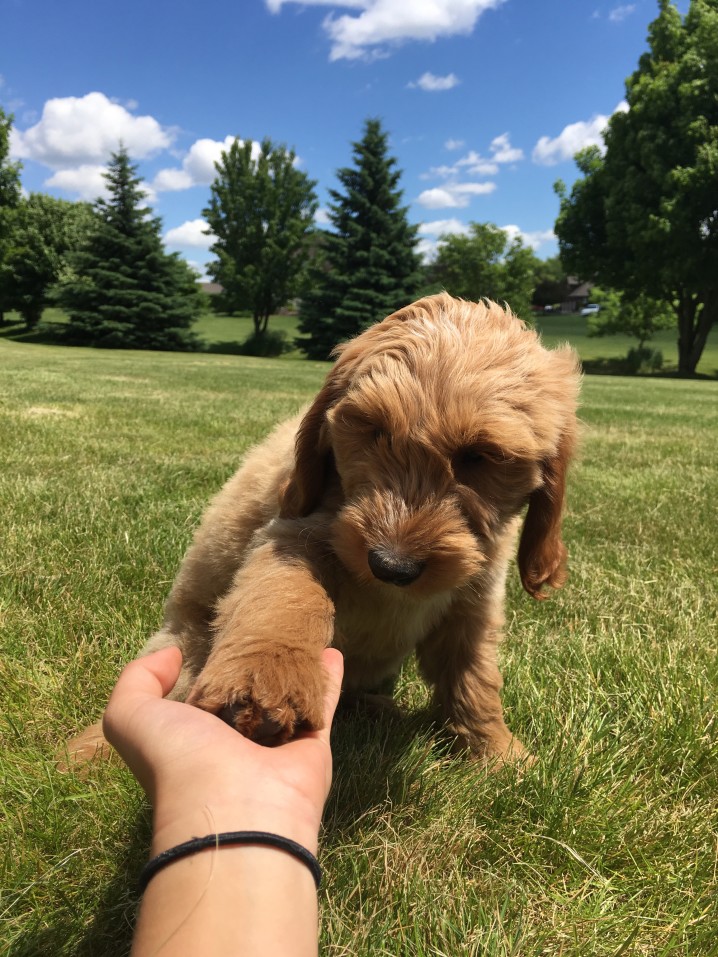
A good rule to follow is at 8 weeks old multiply your puppies’ weight by 4. This should give you a good guess on your puppy’s healthy adult weight.
Most dogs do most of their growing in the first 6 months of life. Smaller and miniature Goldendoodles will be half-grown at 4 months of age, with larger Goldendoodles taking a few months longer to reach this half-grown point. The larger the dog, the longer it will take them to reach adult size.
When will my Goldendoodle Puppy stop growing?
It may seem as if your Goldendoodle is getting bigger each day. Most Goldendoodle will be done growing by 1 to 2 years of age.
They will usually reach their maximum height by 1 year of age and just fill out a little bit in the next year.
Miniature Goldendoodle will be done growing by 7 to 10 months. The smaller the dog, the quicker they reach their adult body weight. Standard Goldendoodle should reach their full size by 2 years of age.
After your Goldendoodle reaches 1 year of age, you need to monitor what you are feeding them. Goldendoodle’s can quickly become overweight, which can lead to many joint and other health problems.

Adult Goldendoodle Stage
Since your puppy is now over a year old, they are not growing, but there are some things that you need to consider as they start to get older.
Goldendoodles that have just matured are usually very active. As your Goldendoodle gets older, they will start to slow down and sleep a little more.
There are diseases that you need to look out for as your Goldendoodle gets older. If you notice any of these signs in your Goldendoodle, you need to see a veterinarian.
- Vomiting
- Diarrhea
- Limping
- Acting Strange
- Abnormal weight gain or loss
- Masses or lumps that suddenly developed
All of these could be signs that there is something going on in your Goldendoodle. Goldendoodles. These are common problems that your adult Goldendoodle could have.
Arthritis
Your adult Goldendoodle will need to be fed food that is moderate in calories, and you will need to watch the number of treats that you are feeding your dog.
An adult dog can easily become overweight. Obesity in dogs is a common problem seen in all dog breeds, which can lead to joint problems and arthritis.
If your dog is limping or having trouble moving, let your vet know, they can start your Goldendoodle on joint supplements or other pain medication to help them get around better.
Allergies
If your dog is going to have allergies, you will usually notice this after 1 year. Your dog’s immune system must fully develop for their allergy problems to show up. Most dogs will have allergies at the same time that people do.
In the spring, most trees are blooming and release their pollen. During this time, most people are sneezing and have watery eyes and noses. Your dog may also show signs of allergies during this time. Common signs of allergies are itching and scratching.
This may be their ears or anywhere on their body. There are many at-home ways that you can help your dogs with allergies. These include:
- Weekly baths
- Benadryl 1mg/pound of body weight
- Limiting outside time during the pollen season
By keeping the pollen off your dog’s fur, they will not have as bad of a response to these allergies.
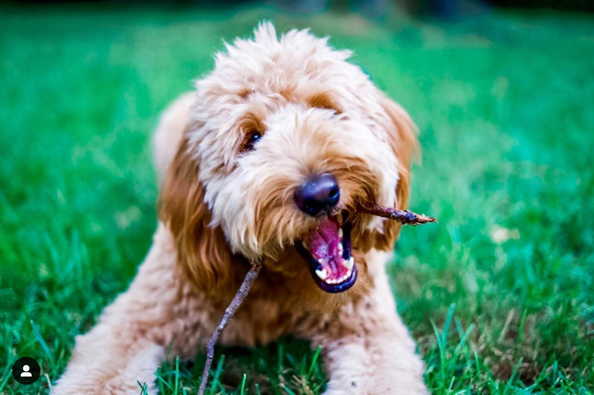
Dental Disease
Poodles are known for dental problems. These dogs can easily have excess tartar build-up on their teeth. By looking at your pet’s teeth, you will easily be able to tell if your dog needs a dental cleaning. Common signs of dental disease are:
- Brown Tartar on their teeth
- Bad breath
- Missing teeth
- Pus around the teeth
- Red and inflamed gums
If you notice any of these signs, you need to take your dog for professional dental cleaning by your vet. They will lightly sedate your dog and clean their teeth just like people get at the dental office.
Vaccinations for Adult Dogs:
As your dog gets older, they will still need a few booster vaccines, just not as often. Common booster vaccines are:
- Rabies: How often your dog needs a rabies vaccine will depend on where you live. Some places require this vaccine every year, while some areas may only require it every 3 years. Your vet will know your local laws and be able to guide you on how often your pet needs this vaccine.
- Distemper/Parvo: Parvo is not as much of a concern once your dog is no longer a puppy. Your adult dog should receive its booster vaccines as they can still get parvo as an adult. This vaccine usually comes in combination with distemper, parainfluenza, and sometimes Leptospirosis. This vaccine is commonly known as a 5-in-1.
- Kennel Cough: This vaccine is especially important if your dog is going to the groomer or boarding facility. This is where kennel cough can easily spread from one dog to another. Kennel cough is a very contagious cough that your dog could get from other dogs at the groomer or in the boarding facility.
Heartworm, Flea, and Tick Prevention
Your dog will also need to be on monthly flea, tick, and heartworm prevention. These parasites can cause many problems in your dog that can be easily prevented by giving your dog a tasty treat each month.
You will need to give your dog this medication for their whole life each month. Your veterinarian can go over all the different options of different pills that are available for your dog.
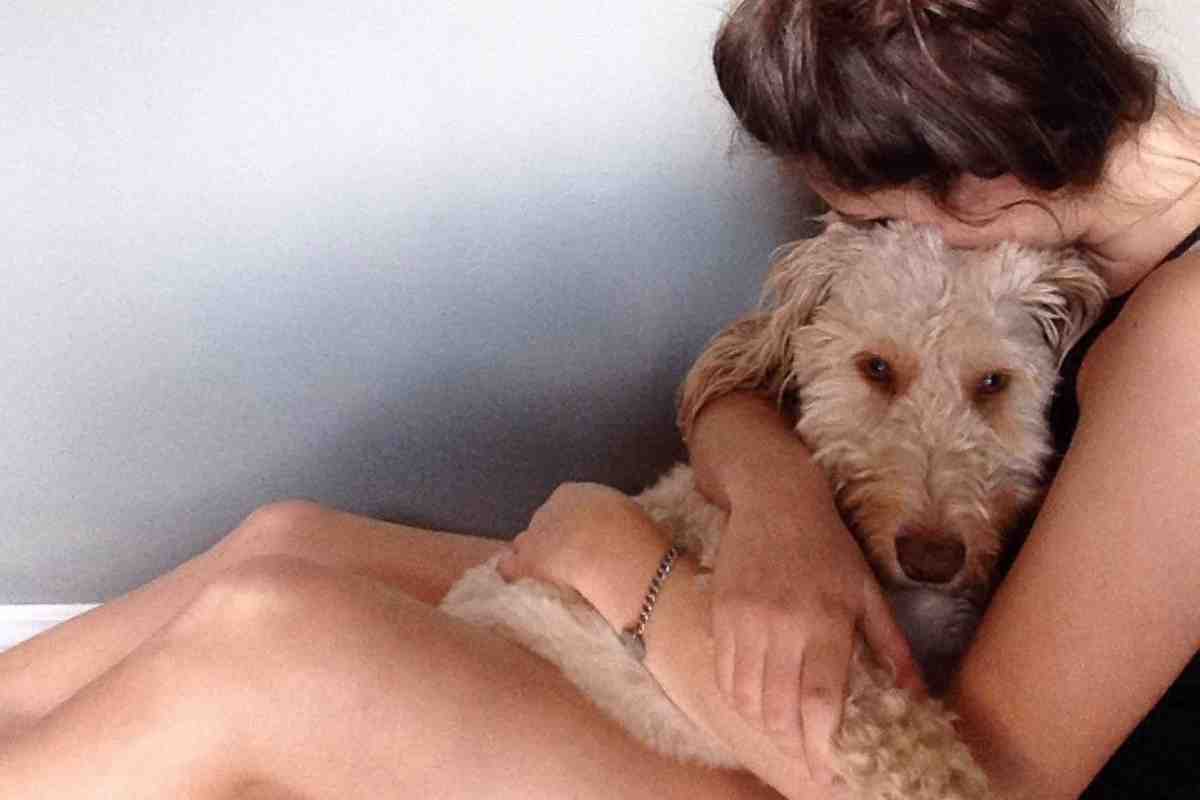
Senior Adult Stage
Once your Goldendoodle is about 7 years old, they are considered a senior adult. These dogs will need to be monitored for any signs of illness, as most illnesses will start to show up around this time. Older Goldendoodles commonly develop these problems:
- Hypothyroid
- Eye problems
- Hip and joint pain
If you notice that your senior adult Goldendoodle has started to slow down some, it may just be due to old age, but there may be something going on causing this aging. Your veterinarian can examine your dog and see if there is anything wrong.
Most vets will be recommended bloodwork done at least once a year, if not more often, and at least an exam every 6 months. Older dogs can develop problems very quickly that, if caught early, can be easily treated.
Senior Goldendoodle Diet
At around 7 years old, your senior Goldendoodle will need to switch to a senior diet. These diets have the extra protein that your older dog will need in order to stay at a healthy weight. Make sure that this is a high-quality diet with the first ingredient being protein. It is also better if it is whole protein and not a protein meal.
As your Goldendoodle ages, you will need to provide extra support to help them through any problems that they encounter. Continuing to take care of your Goldendoodle and even spoiling them a little extra during their golden years will allow your Goldendoodle to live a long, happy, and healthy life.
Final Thoughts
Watching a puppy develop from birth to adulthood and on into a senior adult life can be rewarding. During each stage, there are certain things that you need to look out for and consider. Your vet is a great source of knowledge in keeping your pet healthy.
Make sure to schedule routine health exams and continue to vaccinate your Goldendoodle. Routine maintenance can catch a disease early in your Goldendoodle’s life so that it can be easily treated.
This way, your Goldendoodle will stay healthy and live a long and healthy life. Goldendoodles can be a very fun, loving, and energetic dogs that will fit great into any house.
Related Content You May Find Interesting
Here are some more articles that may be of interest to you if you have a doodle puppy.


